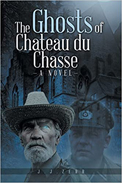
 |
When Navy veteran Bill Marshall finally decides to take a back seat to his wife's budding law career, his sincere intention is to allow Kate to grow. Meanwhile, retirement will allow him to spend more time with their three children: Heather, JR, and a somewhat timid Sally. Unfortunately for the short-term health of Bill and Kate's relationship, the Navy adamantly refuses to accept Bill's resignation and instead assigns him to NATO military headquarters in Belgium. Pressured by the oath of office versus the promise he made to his wife, Bill is stuck between a rock and a hard place. The unraveling of this plotline alone would have made for an intriguing read. However, the author adds even more to the tale. When the storyline reaches Belgium, where the Chateau de Chasse is Bill's version of a consolation gift to Kate, the plot arc turns undeniably sinister.
One decision snowballs into a series of events that create a wide chasm between the Marshalls. The entry of Louis Defonce adds an entirely different dimension to the novel, one that allows readers to understand the root cause of good, evil, and the harrowing choices one faces between fear and conviction that ultimately help the individual fall on either side. As the story delves into metaphysical and philosophical musings, a two-hundred-year-old tale emerges that is on a direct collision course with both Defonce and the Marshalls. Digging deeper, Zerr uses Defonce and his history during World War II to flesh out a plot that impels audiences to wonder whether witnessing traumatic events can permanently shift a good spirit into a bad one. And at its core, Zerr's story encapsulates all the elements of mind, body, and spirit to not only shed light on the atrocities committed during World War II but also paint the contrast between an entity of pure innocence and a spirit enshrouded by darkness.
With no shortage of character development, the novel prominently features Louis' sister, Henrietta Defonce, her adult son with Down syndrome, Rene, and the gypsy siblings, Ivan and Anastasia. The latter are gifted with the ability to peer within an individual's spirit to see their true aura. When strange things happen at the chateau, and a surprising change overtakes young Sally Marshall, the characters experience a heightened sense of urgency that ultimately brings the chateau into central focus. The author's ability to create characters that one can connect with, even when they may not be the protagonist, is unique and captivating.
From a stylistic perspective, the narrative is fluid and seamless to follow. Even shifting from present to past, the reader is constantly kept in the loop of the evolving character arc and storyline. With a laser focus on the resistance during World War II, a question begs to be asked: what prompts such fierce hate in an individual? Specifically, why does war become a license to forget one's humanity, to forget love? Overall, the plotline for the novel, compelling as it is, is a powerful conduit to ask probing questions surrounding the human psyche and human behavior as a whole. Marked by its free-flowing energy, Zerr's work is both enriching and entertaining, creating a meaningful experience.
RECOMMENDED by the US Review